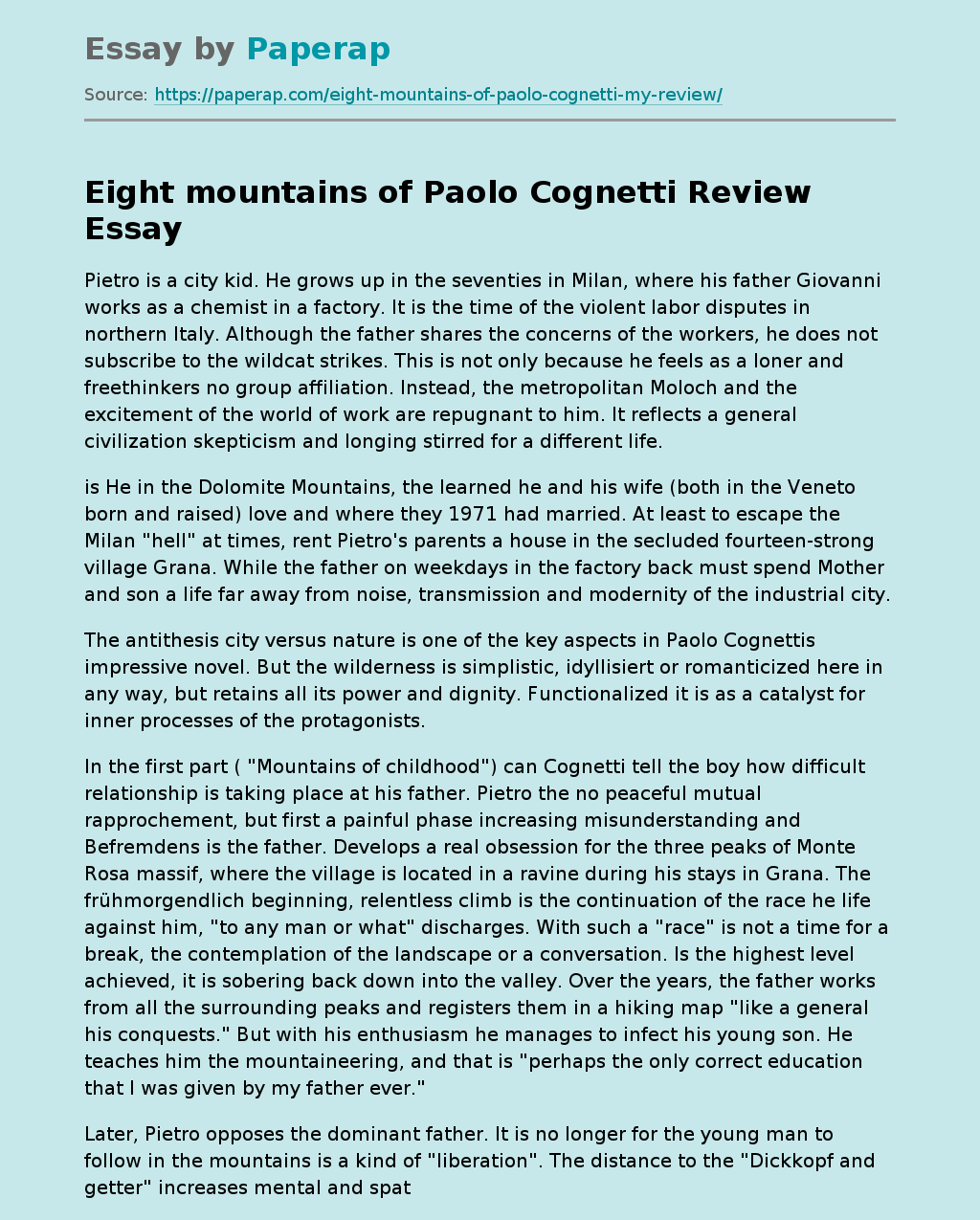Eight mountains of Paolo Cognetti Review
Pietro is a city kid. He grows up in the seventies in Milan, where his father Giovanni works as a chemist in a factory. It is the time of the violent labor disputes in northern Italy. Although the father shares the concerns of the workers, he does not subscribe to the wildcat strikes. This is not only because he feels as a loner and freethinkers no group affiliation. Instead, the metropolitan Moloch and the excitement of the world of work are repugnant to him.
It reflects a general civilization skepticism and longing stirred for a different life.
is He in the Dolomite Mountains, the learned he and his wife (both in the Veneto born and raised) love and where they 1971 had married. At least to escape the Milan “hell” at times, rent Pietro’s parents a house in the secluded fourteen-strong village Grana. While the father on weekdays in the factory back must spend Mother and son a life far away from noise, transmission and modernity of the industrial city.
The antithesis city versus nature is one of the key aspects in Paolo Cognettis impressive novel. But the wilderness is simplistic, idyllisiert or romanticized here in any way, but retains all its power and dignity. Functionalized it is as a catalyst for inner processes of the protagonists.
In the first part ( “Mountains of childhood”) can Cognetti tell the boy how difficult relationship is taking place at his father. Pietro the no peaceful mutual rapprochement, but first a painful phase increasing misunderstanding and Befremdens is the father.
Develops a real obsession for the three peaks of Monte Rosa massif, where the village is located in a ravine during his stays in Grana. The frühmorgendlich beginning, relentless climb is the continuation of the race he life against him, “to any man or what” discharges. With such a “race” is not a time for a break, the contemplation of the landscape or a conversation. Is the highest level achieved, it is sobering back down into the valley. Over the years, the father works from all the surrounding peaks and registers them in a hiking map “like a general his conquests.” But with his enthusiasm he manages to infect his young son. He teaches him the mountaineering, and that is “perhaps the only correct education that I was given by my father ever.”
Later, Pietro opposes the dominant father. It is no longer for the young man to follow in the mountains is a kind of “liberation”. The distance to the “Dickkopf and getter” increases mental and spatially with time. Only years after the death of the father who left his son so many tracks and a piece of land bequeathed in the mountains, fearing Pietro that he as a result of his absence might “Important missed” his time was wasted with trivialities.
In the hamlet Grana there except the narrator one more child, the one year older than Bruno. From the tight-lipped, simple boy who has only an elementary school, learning Pietro, to adapt to the unpredictable characteristics of the seasons and to appreciate the diversity of the mountains between temptation, beauty, danger and violence. These impressions characterize it sustainable, and life in and with nature is part of the core of his being
While Bruno all this is enough -. He is considered mining make a living and never leave the mountains – expands Pietro in circles. As a young man he leaves this “paradise”, is training to become a documentary filmmaker, lives in Turin, will travel to the Himalaya. From Nepal to legend, to which the title of the novel refers and a philosophical question derives from the dates: The gigantic summit Sumeru is the center of the world. Eight mountains surround him. Which of these places brings true fulfillment?
The camaraderie of the two boys matured over the years into an honest, responsible men friendship that is so intense and determined that Pietro breaks his long stay abroad later to Bruno’s call for help from to follow the home.
“Eight mountains” is a quiet, soothing reading, their values, stimuli and effects, waiting to be discovered and appreciated. So the tension between father and son is always available subliminally without them would have to be turned inside out. Apart from the mother, all the figures are introverted, and their feelings are strongly influenced by the nature and the prevailing moods of the seasons from spring break-up, high emotions in the summer, relaxation and ripening in the autumn to the long, dark solitude of winter.
the almost archaic close to nature, which is also the author Paolo Cognetti has learned to love – born in 1978 in Milan and traveled widely, he spends now at least half the year in a remote mountain cabin – inevitably leads to a critical view of modern man. Violent and aggressive to Father Giovanni expressed on tourists, skiers and climbers who descend in a convenient way about nature. The enormous destructive interference to the masses of the mountains to “open up”, you steal their dignity and make him (and the author) angry. The modest mountain farmer Bruno is a symbol of a responsible, respectful, sustainable, not romantic, but busy dealing with the landscape. Man can in his efforts by harnessing, the nature conquered their space back quickly. Denied giving her the respect she strikes back relentless and brutal.
This novel includes a lifetime and tells the history of a sincere, steadfast friendship. It is a plea for traditional interpersonal values and behaviors – are reliability, perseverance, respect, trust, remain true to itself, be moderate, be simple things. In the end it is about the eternal questions of how and where the man finds himself, which makes him happy.
Paolo Cognettis book ” Le otto montagne < "Paolo Cognetti: "Le otto montagne" at"
Eight mountains of Paolo Cognetti Review. (2019, Nov 18). Retrieved from https://paperap.com/eight-mountains-of-paolo-cognetti-my-review/

